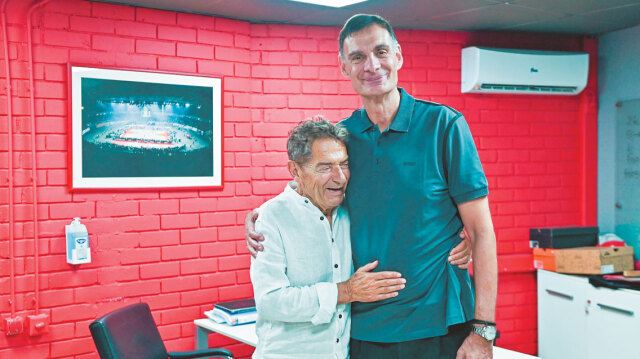Giorgos Bartzokas to Danikas: “Olympiacos is a concept — but I’m always open to new opportunities.”
DIMITRIS DANIKAS: What a presence! His history, relationships, and stories are remarkable. Sitting across from Giorgos Bartzokas in his office at SEF, I was struck by a profound realization — there are likely no more than four people like him in all of basketball. He’s that unique. Being in his company made me feel small. “How tall are you?” I asked.
GIORGOS BARTZOKAS: “I’ve lost a bit of height — I’m now 2 meters. I used to be 2.01.”
D.D.: And what about your father?
G.B.: He was tall for his time, too. Andreas Bartzokas was a legendary figure who orchestrated the daring escape of 27 political prisoners from Vourla Prison on July 17, 1955.
D.D.: That escape supposedly inspired The Great Escape, the 1963 film featuring Steve McQueen, correct?
G.B.: That’s the story! Paul Brickhill, James Clavell, and W. R. Burnett were said to have drawn inspiration from the Vourla breakout. Why wouldn’t they? It’s an incredible tale. They dug a tunnel right beneath my father’s bed using nothing but spoons and penknives.
D.D.: Absolutely incredible.
G.B.: It sounds fictional, doesn’t it? Every day, they would gradually move soil, concealing it in flowerpots and basins. After the escape, most of the prisoners were swiftly recaptured. My father was found in two to three days. There was a reward for turning them in.
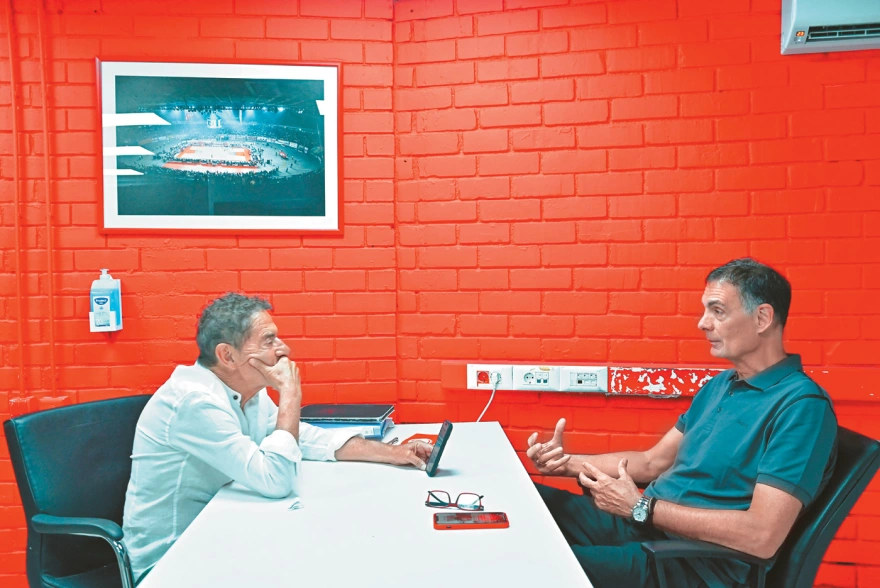
Scene 1: The Great Escape — with spoons and penknives
D.D.: Let’s start with your beginnings — your roots.
G.B.: My father hailed from a small village in Arta called Kentriko, formerly known as Nisista. At just 12 years old, he moved to Athens to study at the Athens University of Economics and Business. Life was challenging; he had six younger siblings. One by one, they followed him to Athens for their studies — in law, engineering. He became a father figure to them.
To support the family, he worked as a courier for three sisters, the Efkleidous, who ran the newspaper Vradyni.
D.D.: What year was this?
G.B.: He was born in 1926, so this was right before WWII. He was too young to fight, but later became heavily involved in the resistance and leftist politics. In total, he spent 12 years in prison and exile — in places like Aegina, Corfu, Leros, Gyaros, and of course Vourla.
D.D.: During the dictatorship?
G.B.: Yes. In 1967, he attempted to flee to Paris but was apprehended at the airplane steps.
Scene 2: “As a child, I thought the secret police were my uncles.”
D.D.: When were you born?
G.B.: In 1965.
D.D.: Do you have any siblings?
G.B.: I have one sister, who is two years older.
D.D.: What’s your first memory of your father?
G.B.: I was four years old when we visited him in Leros with my mother. We saw him for just one day before leaving. He was released after the Metapolitefsi in 1974.
D.D.: And he never signed a repentance declaration.
G.B.: Never.
D.D.: Would you have signed in his place?
G.B.: Absolutely not. But as a child, I often wondered, “Why doesn’t Dad just sign? Why can’t he come home?” We grew up fatherless. The secret police would raid our home. My mother said I would sit at their feet, thinking they were family friends. They searched everywhere, overturning everything. It was traumatic.
D.D.: It sounds like a film plot.
G.B.: Perhaps my father’s life is. Mine? Not quite.
Scene 3: “I grew up among legends — Kyrkos, Glezos, Iliou.”
D.D.: Did your father return to political life?
G.B.: Yes, he was a founding member of EDA (United Democratic Left). I remember accompanying him to EDA’s Administrative Committee meetings every Wednesday on Akadimias Street. I was like their mascot — everyone recognized me.
D.D.: You were raised in that ideological environment — values, ethics, dreams for a better world.
G.B.: Exactly. My mother’s family was mostly communist, too. Many of her brothers were wanted figures; there are incredible stories from that post-civil-war era, not just in my own family, but across many.
D.D.: And now?
G.B.: Those values — from both the so-called left and previous governments — have become tarnished. The ideals were compromised. That’s what truly hurts.

Scene 4: “Olympiacos is a concept — but I’m always open to new opportunities.”
D.D.: Let’s discuss basketball. What does Olympiacos represent for you?
G.B.: Olympiacos is an idea. It embodies history, values, and a mindset. However, I’m always prepared to walk away. I don’t cling to positions out of fear. I stay true to myself, and when I feel I can no longer contribute meaningfully — I’ll leave.
D.D.: How do you cope with pressure?
G.B.: I struggle when I see logical arguments undermined — when decisions lack rationality and meritocracy. That deeply frustrates me.
Giorgos Bartzokas transcends the role of coach. He embodies a remarkable legacy — a thinker, a leader, and a man whose conscience is firmly rooted in one of the most dramatic periods of modern Greek history. His narrative, akin to his father’s, reinforces the notion that values extend beyond politics and conflict—they resonate on the court, too.
Thank you! Here are Scenes 5 and 6 of the interview between Giorgos Bartzokas and Dimitris Danikas, translated into a polished, expert-level sports interview style — clear, articulate, and emotionally insightful, as if for a prestigious international sports magazine or documentary.
Scene 5: “In basketball, Olympiacos lacks nothing compared to any European club.”
DIMITRIS DANIKAS: You’ve been fortunate to meet incredible people and experience remarkable moments throughout your career.
GIORGOS BARTZOKAS: You know, I didn’t fully appreciate it while it was unfolding. But with time, as you reflect, you start to recognize the influences around you, the foundations laid, and the individuals who shaped your perspective.
D.D.: After your initial experiences with smaller teams, when did you make the leap to higher levels?
G.B.: I served as assistant coach to Panagiotis Giannakis at Marousi for three years. Then I had my first chance as head coach at Olympia Larissa, where I spent another three years — that was my initial head coaching position in the Greek top division. My journey then led me back to Marousi, followed by a two-year stint at Panionios, and eventually to Olympiacos for my first term in 2012. I coached there for two and a half years before moving abroad — first to Lokomotiv Kuban in Russia, then to Barcelona for a season, and back to Russia with Khimki.
D.D.: What’s the fundamental difference between coaching Barcelona and Olympiacos?
G.B.: Each club possesses its own distinct character. Barcelona is very political — it stands as a symbol of Catalan identity. Many executives are former politicians, and the club itself is owned by its 100,000 members, who vote for the board. That “més que un club” isn’t just a slogan — it reflects reality. Complications arise due to the political context.
D.D.: In what way?
G.B.: For instance, the administration is elected every four years through campaigns — two factions vie for the presidency. This creates built-in opposition. Half the supporters may rejoice when the team wins, while the other half may be dissatisfied because they want the current leadership to fail for a chance at a takeover. I realize it sounds simplistic, but that’s the reality.
D.D.: Thus, the contrast with Olympiacos couldn’t be more pronounced.
G.B.: Olympiacos is a major player in European basketball — without question. However, at Barcelona, the basketball section is part of the wider FC Barcelona umbrella. It’s primarily a football club; even the title underscores that: Futbol Club Barcelona. All sports fall under the authority of a single president.
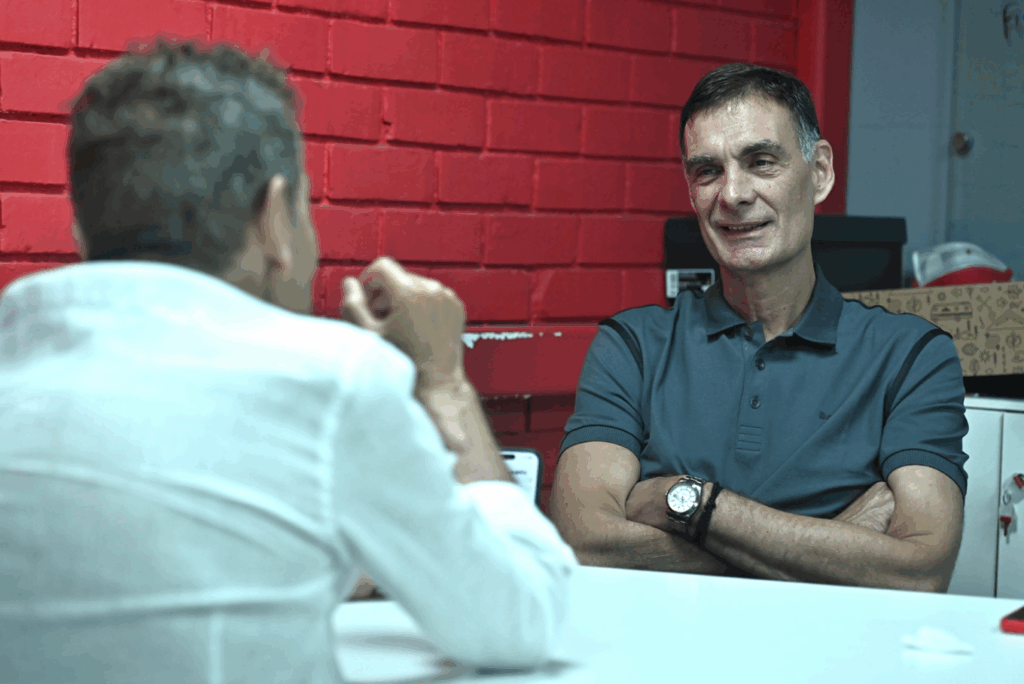
D.D.: While Olympiacos basketball operates independently.
G.B.: Precisely. It remains one club, yet has separate leadership for football and basketball. Olympiacos basketball stands entirely on its own. And in terms of basketball, Olympiacos holds its own among the best in Europe. We have three EuroLeague titles, reached four consecutive Final Fours — we’re respected across the continent.
Scene 6: “The Nazi party emerged through sports clubs — fanatics are easy to manipulate.”
D.D.: Let’s explore that topic further. It was impressive that two Greek teams made the Final Four — yet neither reached the final. Was there a sense of overconfidence within Olympiacos?
G.B.: Not in the slightest. We had a 20-day preparation before the Final Four — during which seven of our players were injured. On paper, we appeared fit, but in reality, we were completely out of sync and unprepared. Seven players were receiving injections just to participate. Our practice sessions were ineffective. We were decimated. Overconfidence was not something we considered.
D.D.: But expectations were sky-high.
G.B.: Exactly — all season long we led the standings, and everyone viewed us as the favorites. Internally, however, we understood that winning the EuroLeague in that condition would require a miracle. The Final Four is ruthless. It’s win or go home in one night. The competing teams are elite too. When you’re recognized as the favorite, the pressure can weigh you down more than it inspires you. That situation, combined with Monaco’s exceptional performance, was our challenge.
We genuinely believed we could clinch the trophy this year. But regardless of how much you invest or how well you prepare, the trophy isn’t guaranteed.
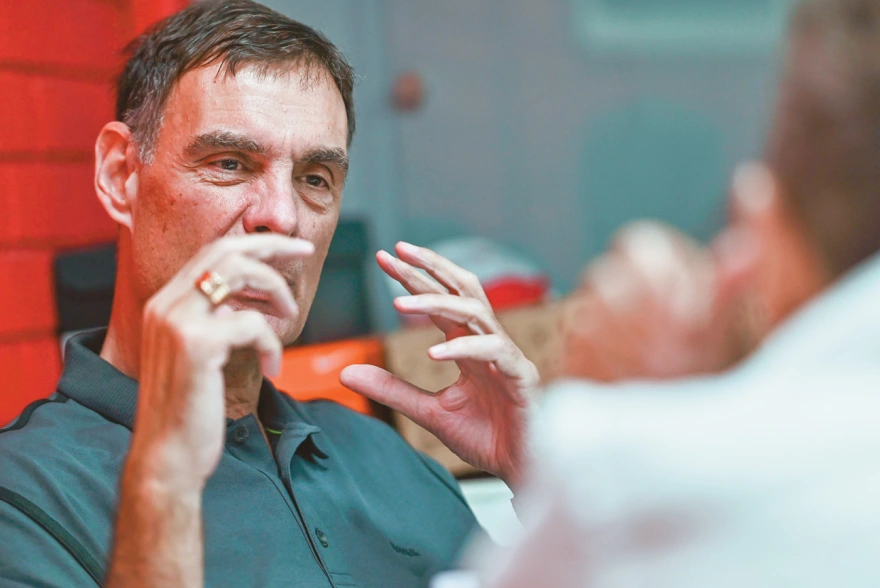
D.D.: Winning isn’t guaranteed every time. Look at Manchester United — my team — they’re in disarray.
G.B.: You’re a United supporter? So am I — a die-hard fan! My uncle, who made me an Olympiacos supporter, also introduced me to United. I’ve followed them since childhood.
D.D.: Same here. But everything collapsed after Ferguson left.
G.B.: Such cycles are inevitable.
D.D.: Exactly. Winning indefinitely is impossible.
G.B.: True — but try explaining that to die-hard fans.
D.D.: What’s your perspective on fanatics? How do you handle them? Aren’t they destructive — in sports, politics, and beyond?
G.B.: It varies. Factors like age, social background, and living standards all play a role. Most ultras are young, and youth is often easily manipulated.
Consider this example: the Nazi party in Germany — it gained traction through sports clubs.
When young individuals have limited prospects, low incomes, lack of jobs, and no family support, they seek victory somewhere. They crave a sense of triumph, even if it’s just through their team. This results in intense emotional reactions, leading to violence when they lose and exuberance when they win.
In Liverpool, fans are dockworkers; in Newcastle, coal miners. Think about the challenges of their week. What offers them pride? Their team winning on Saturday. This drives extreme emotions — and often, extreme behavior.
I completely oppose that mindset, but I comprehend its origins.
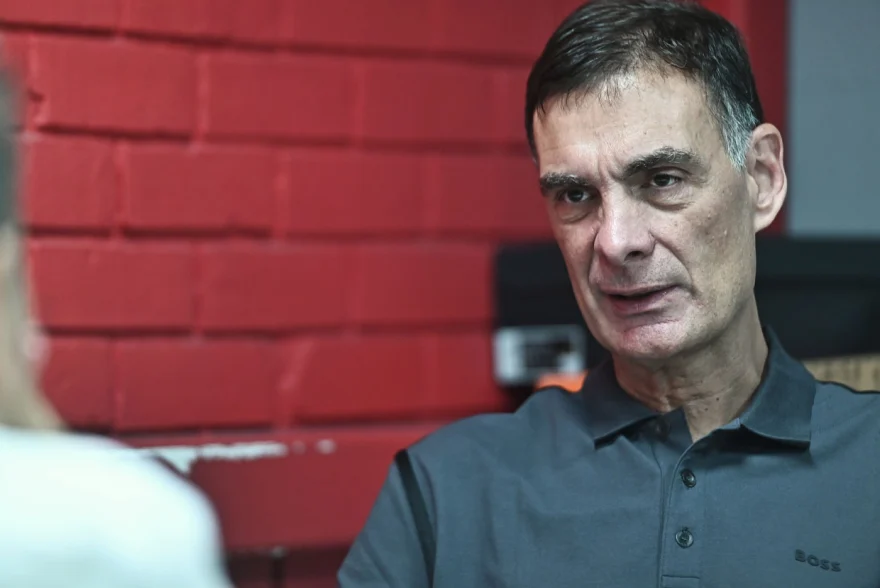
Scene 7: “Every player is now a business.”
D.D. Have you had issues with hardcore fans?
G.B. During my first term with Olympiacos, even though we won the EuroLeague, I departed after a loss to Panathinaikos. Essentially, I left because, upon our return to SEF, there were around 500 people present with aggressive intentions toward us. Nothing extreme occurred, but they were hostile towards me and the whole team. As head coach, I resigned for that reason — I believe Olympiacos and its own fans shouldn’t be against the team. In my second term, my reception has been entirely different. My international experience and the nine titles we’ve secured in five and a half years have led to a different perspective. Moreover, as a lifelong fan of Olympiacos, I’m viewed as “one of their own.” However, this dynamic is always fragile — even families can be divided over it. It’s tenuous because it hinges on whether the team continues to win.
D.D. But how does a game shift from being entertainment for fans to resembling a battleground? A sporting event should evoke enjoyment and fun.
G.B. Which fan are you referring to? Currently, a significant majority of Olympiacos fans would prefer to win a game without watching it rather than experiencing it as a spectacle and losing. Many of my friends, overwhelmed by stress, don’t even watch crucial games — they step out for a walk until it’s over. So, don’t perceive it as mere entertainment. It’s far from cinematic, theatrical, or musical performances. It’s no longer a game — it’s much more serious now.
D.D. Financial aspects are a factor as well, right?
G.B. Absolutely. The stakes are enormous now. Many individuals rely on the sports industry for their livelihoods. We’re talking about sizable corporations.
D.D. Which corporations? You mean sponsors?
G.B. There are sponsors, but every player is a business unto themselves now. When a player commands immense earnings and has a support team around them, they essentially operate as a small firm. This contrasts starkly with the coach’s role, which emphasizes teamwork, collaboration, and selflessness — players need to play for each other. In contrast, the player’s environment drives individualism. Their agents tell players only what they want to hear to avoid being replaced. To secure better contracts, they need superior statistics and more points. This personalizes the game, while basketball is fundamentally a team sport. In the U.S., the trend is rapidly shifting towards individualism—star players can even dictate who the coach is or what their teammates should be.
D.D. So a strong player can influence the team’s direction?
G.B. To a significant extent, yes. It also depends on the culture. For example, in England, when club owners were native, coaches maintained their positions for decades — Ferguson for 28 years, Wenger over 20 with Arsenal. The coach was respected, particularly if they executed their role well. However, with the influx of foreign owners from various regions, the culture shifted. Immediate results are expected, often within six months or a year; otherwise, you’re dismissed. Hence, today in England, the coach plays a diminished role, and coaching careers are more replaceable than before. Basketball, being more synergistic than football, reflects this reality even more.
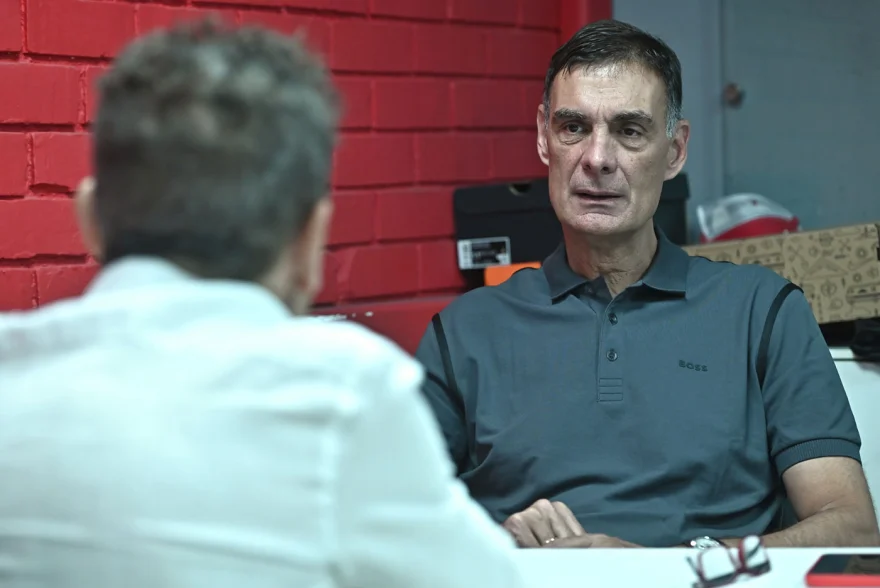
D.D. Why is that?
G.B. Because everyone plays both offensively and defensively. If someone moves to a specific spot, another must fill that gap automatically. There’s a constant interaction on both ends. If one of the five becomes overly selfish, it can disrupt team chemistry. Relationships in basketball aren’t built in hotels or during dinners — they’re cultivated on the court. As a coach, you’re held accountable for results grounded in teamwork, solidarity, and collaboration, while the prevailing system often pushes against it, reinforcing the “don’t pass the ball to that guy” mentality. This is evident even among youth players. Parents attending games often become the worst type of fans, pushing kids to prioritize personal success over teamwork, which ultimately shatters the joy and camaraderie that sports provide.
Scene 8: “A daily struggle: how the ‘we’ triumphs over the ‘me’”
D.D. There’s a significant contradiction — individualism often triumphs over collectivism. How do you address this?
G.B. Through diligent conversations. I also focus on recruiting or retaining players who prioritize the team over personal gains, hoping they impart this mentality to others. Everyone tends to think about themselves — myself included; it’s my career after all. Yet, I must foster that united mindset. There are still players who can unify, mitigate crises, and talk to those with inflated egos, as there are plenty in any team. Ultimately, it’s a continuous battle — how the “we” can defeat the “me.”
D.D. Are they all stars?
G.B. Not all, but in some form, yes.
D.D. Stars, celebrities. For example, Milutinov received a substantial contract. How is it that these young talents earn so much while so many struggle?
G.B. We exist in a bubble. This contradiction reflects our society and is closely tied to entertainment. Basketball is entertainment. Just as Hollywood stars can earn millions for a film, or Coldplay can fill OAKA twice and rattle off billions on tour, people willingly pay to experience a show. Naturally, the thing people invest in leads to huge financial rewards for those delivering it.
D.D. And it morphs into a monster.
G.B. Isn’t that the nature of our society? Aren’t there many who grow fantastically wealthy while others cannot afford even basic necessities?
D.D. Sports, music, cinema — they all mirror that system. How do you manage your players?
G.B. These young individuals face numerous insecurities and stress. The pressure is immense. Earning wealth is one aspect — maintaining it is an entirely different story. How do you maintain your image, perform excellently in significant games, and secure victories that bring more earnings? All of this creates insecurities and takes a toll on a person. Their lives are anything but normal. After playing 80 games in 10 months, alongside everything else — all the travels, waking up at 5 a.m. from adrenaline, and heading straight to a flight post-game — that’s no ordinary existence. They lack weekends like most people to spend time with family or clear their heads. When we’re working, we might only get 4-5 days of time off in ten months. Summer brings maybe a month where we attempt to pretend to experience a regular life. That’s the reality of it all.
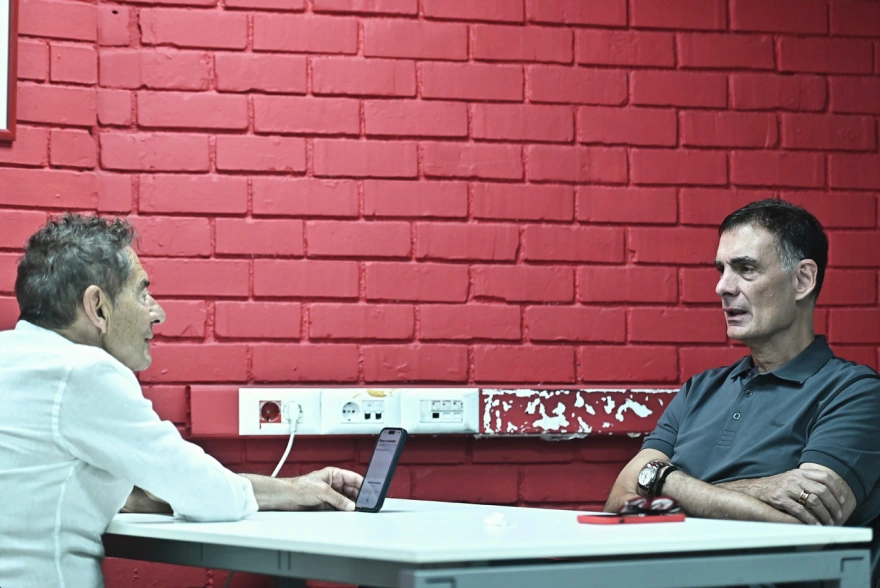
D.D. What does your daily routine look like? Do you start your day at 6 or 7?
G.B. Not quite! I typically wake around 8 to 8:30.
D.D. Do you work out?
G.B. No, I go straight to the court for morning practice, which runs until midday. Afternoons are free.
D.D. What do you do at the office?
G.B. I hold meetings with my assistant coaches and prep for games.
D.D. How many assistants do you have?
G.B. Four, purely basketball coaches. We also have trainers, physiotherapists, and doctors — all of us meet daily.
D.D. What’s the total staff count?
G.B. Around fifteen support staff members for the players.
D.D. What specific roles do assistant coaches fulfill?
G.B. Each has their specialty — one focuses on defense, another on individual player development, and yet another on offensive strategies. The doctors play crucial roles. For instance, if a player gets misdiagnosed or receives incorrect treatment — and they earn €3 million annually — being sidelined for six months could mean €1.5 million wasted. This emphasizes why their roles are so vital; we need to be extremely cohesive.














